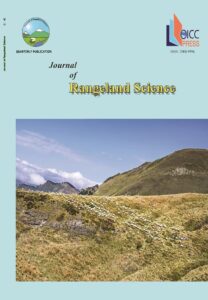Assessment of Health Conditions of Mountain Rangeland Ecosystem Using Species Diversity and Richness Indices, Case Study: Central Alborz (Iran)
Authors
-
Mohammad Hasan Jouri
 1
1
- Dnyan Patil 2
- Rivandra S. Gavali 3
- Nosrat Safaian 4
- Diana Askarizadeh 5, 6, 7, 8
Abstract
Based on the importance and role of species diversity and richness as a
measurement of the health of an ecosystem; studying of their components can lead to
evaluate the health condition of rangeland. This research was carried out in a part of
highland mountainous rangeland of Mount Alborz Range in Iran. Diversity and richness
were assessed as an ecosystem health indicator. The study area was located between 2200
to 4200 m altitude in north of Iran. The rangeland vegetation was covered by grass as the
dominant species along with forbs and cushion like species. The rangeland was grazed by
livestock as summer rangelands. The samples were collected in reference, key, and critical
areas using transects. The data were analyzed by stepwise regression in that rangeland
condition as dependant variable and vegetation form as independent variables. Plant
diversity and richness indices were calculated by PAST Software. The results showed that
grass species diversity had the highest correlation with the rangeland condition in key site.
The cushiony species and the combination of grass and forbs had high correlations with the
rangeland condition in both critical and reference sites. The key and critical rangelands had
the highest and lowest diversity, respectively. The critical zone was in disequilibrium
conditions so the rehabilitation of vegetation cover is recommended for the similar regions.
It was concluded that Long-term enclosure can decline the species diversity and richness.
Moderate grazing is the best tool to use the grazing land without severe reduction in
abundance and biomass of species.


